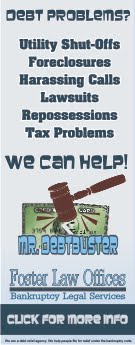When you think of bad actors in the debt collection industry, you might conjure up an image of ruthless collection agents on the telephone shouting obscenities at grandmothers in the middle of the night trying to scare them out of their last cent.
Illegal harassment does exist, but another type of abuse has been gaining more traction in the industry, consumer advocates say.
Increasingly, debt collectors are filing lawsuits and winning judgments against people without the records to back up their claims, these experts say. In some cases, consumers are having their wages garnished, bank accounts frozen and liens placed on their homes without even knowing they've been sued, and worse yet, for debts they don't owe.
"The debt collection system is in dire need of reform," said Gail Hillebrand, senior attorney at Consumers Union, publisher of Consumer Reports magazine and co-author of a report released last month highly critical of the debt collection industry.

PDF
"The system for resolving disputes about consumer debts is broken," the Federal Trade Commission reported last year that it called on federal and state governments to pass legislation providing "adequate protection for consumers" during debt litigation.
Ms. Hillebrand said one of the most serious problems involves people not finding out they've been sued for repayment until the case is over.
While many consumers don't respond to lawsuits, Consumers Union found that in many cases they did not receive the required notice from debt collectors that a lawsuit was pending.
When consumers fail to appear in court, the debt collector wins a default judgment, which "frequently requires little more than the name, address and alleged balance of the consumer," according to the report, produced in conjunction with the East Bay Community Law Center in California.
"Once there's a judgment, it's much harder [for a consumer] to say, 'Wait a minute. That's the wrong amount,' " Ms. Hillebrand said.
Take Suzanne, a mother of two in California (she did not want her last named revealed), who told Consumers Union she found out she had been sued by a creditor and lost only when she discovered a lien against her home. The creditor claimed she had been properly served with the lawsuit at her residence. Problem was, she said, the purported service date was the same time she was in Oregon with her son looking at colleges.
The Consumers Union report blamed that and other types of debt collection abuses on the booming and largely unregulated debt buying industry, in which collectors buy portfolios of bad debts for pennies on the dollar. They hope to make a profit by collecting a small percentage of those accounts, then resell the portfolio to another debt buyer that restarts the effort to collect.
"Because this process is automated, collectors are not getting the whole file," often only receiving debtors names, dollar amount of the alleged debts and the names of the original creditors, Ms. Hillebrand said.
That can leave consumers in the dark when a debt collector comes calling, she said.
"Maybe you made a $500 purchase and are being told you owe $1,200. What we found is if you ask them for [documentation on the debt and what may have been added for interest and penalties], they don't have it and couldn't show how they calculated it," she said.
"It's hard for you to figure out if it's the right amount and if you should pay it, or if you should fight it," she said.
"If you ignore them, they sue you."
And because the debts get passed through so many hands, often over many years, debt collectors may be pursuing the wrong person or debts that already have been paid or settled.
Another woman told Consumers Union she satisfied a $1,000 debt by paying a debt collector a little each month from her Social Security check. Four years later, she was sued on the same account for more than $5,000 by a different debt collector.
To keep up with an explosion of lawsuits they are filing, debt buyers employ "robo-signers" who sign affidavits attesting that they have reviewed and verified debtors' records, when in fact they may have only looked at basic account information on a computer screen, according to the report.
"An increasing number of consumers are being hounded by debt collectors for unsubstantiated debt," Consumers Union said.
A spokesman for ACA International, a trade association representing debt collectors and debt buyers, said that although the report makes some "interesting points," it doesn't tell the full story.
"Debt collection is more complex than what is mentioned," said Mark Schiffman, director of public affairs for the Minneapolis-based organization.
One important point, he said, is that the report focuses on debt buyers, which own the debt they buy, rather than third-party debt collectors, which work directly for creditors. Debt buyers also hire third-party agencies to do their collecting, he said.
"I'm not trying to say it's not our fault," he said. "But there are some distinctions."
The FTC last year launched a review of the debt buying industry but hasn't yet reported its findings.
Last week, the agency released a report to Congress showing consumer complaints involving debt collection rose 17 percent in 2010 from the previous year. Complaints about third-party debt collectors shot up nearly 25 percent, while complaints about in-house debt collectors were essentially flat.
Overall last year, as in other recent years, complaints about abusive or unlawful debt collection practices topped every complaint category except for identity theft, the FTC said.
The most frequent complaint about debt collectors in 2010 involved consumers being harassed by repeated calls.
Other complaints ranged from collection agents allegedly misrepresenting the amount or status of the debt -- including demands for illegal or unauthorized fees or expenses -- to contacting consumers before 8 a.m. or after 9 p.m. when such calls are prohibited.

 12:54 PM
12:54 PM
 MrDebtBuster
MrDebtBuster
 Posted in
Posted in



